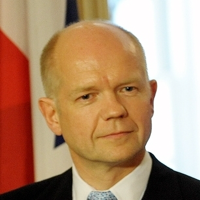Exactly one year after explaining that a future Conservative government would be "highly active and activist in European affairs," William Hague, now the British foreign secretary, signaled quite the contrary when he appeared before the U.K.'s House of Commons Defense Select Committee on March 9. His comments in Parliament showed a worrying misunderstanding of the capacities of the two key European institutions of which the U.K. is a member -- the European Union and NATO.
In response to questions on international alliances and the U.K.'s perspective toward them, Hague argued that NATO is singularly designed for national security whereas the European Union is more directed at facilitating economic prosperity. This is a simplistic and unfortunate understanding of the role these institutions play, as the EU and NATO both have powerful security and economic components.
The EU is advancing its approach to security in new and innovative ways, in parallel to its traditional economic agenda. It is already highly active in counterterrorism policy, for example. The EU has its own "counterterrorism coordinator," who is becoming an increasingly important figure in the implementation of counterterrorism policies across Europe. The union recently published a new Internal Security Strategy (.pdf), and under the Lisbon Treaty it is expected to play a greater role in counterterrorism and industrial policy as it relates to European security.

